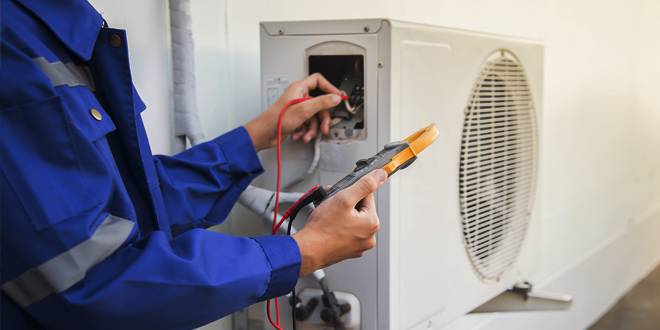
In Long Island, NY, home safety starts with electrical awareness. Our ‘Circuit Breaker 101’ blog brings you essential tips for maintaining a safe and functional home environment. Learn how to manage your circuit breakers effectively, preventing hazards and ensuring peace of mind for your family.
What Is An HVAC Circuit Breaker?
Before diving into safety tips, it’s crucial to understand what a circuit breaker is and how it functions within your HVAC system. A circuit breaker is a safety device designed to protect your home’s electrical circuits from damage caused by overloads or short circuits. It automatically shuts off the electrical supply when it detects a problem, preventing potential fires and other hazards.
Here’s what an HVAC circuit breaker does, simply put:
What It Does
- Stops Overload: The circuit breaker protects your HVAC system from electrical overload. This happens when the system pulls more electricity than it can handle, like during extreme weather, which could damage your system.
- Prevents Fires: It’s also there to prevent short circuits, a serious issue that can lead to fires. This occurs when wires that should not come into contact do so, causing a dangerous electrical surge.
How It Works
Think of your HVAC circuit breaker as a smart safety switch. It automatically cuts off electricity if it senses any electrical faults. It has sensors for different types of dangers: one that detects excessive heat (overloads) and another that responds to magnetic surges (short circuits).
Types of HVAC Circuit Breakers
- Standard Breakers: Common in most homes, suitable for regular heating and cooling systems.
- Advanced Breakers: Includes GFCI (Ground Fault Circuit Interrupters) for damp areas to prevent shock and AFCI (Arc Fault Circuit Interrupters) to stop electrical sparks that can cause fires.
Installation and Rating
Selecting the right size of the circuit breaker is essential. A breaker that’s too small will trip too often, while one that’s too large may not trip when needed, posing a safety risk. This is why proper installation by an electrician or HVAC technician is crucial to ensure the breaker matches your system’s electrical load.
Why It’s Important
A well-functioning circuit breaker is vital for two main reasons. Firstly, it saves your HVAC from potential damage, which can be costly to repair. More importantly, it prevents electrical fires, playing a significant role in keeping your home and family safe.
In summary, your HVAC circuit breaker acts as a guardian for your heating and cooling system, ensuring it operates safely and efficiently, and protecting your home from electrical hazards.
Top 7 HVAC Circuit Breaker Safety Tips for Homeowners
1. Understand Your HVAC Circuit Breaker
A circuit breaker is a crucial safety device in your home’s electrical system, designed to protect against damage from overloads or short circuits. It’s vital to know how it functions within your HVAC system to maintain safety and efficiency.
2. Regular Inspection and Maintenance
Ensuring the safety of your circuit breakers involves routine checks. Have a licensed electrician inspect your HVAC system and its circuit breakers annually. Regular inspections can reveal signs of wear or damage, such as rust or burn marks, and ensure that everything operates safely, particularly in the diverse climate of Long Island.
3. Knowing Your Circuit Breaker Capacity
It’s important to understand your circuit breaker’s load capacity and ensure it matches your HVAC system’s requirements. Overloading can lead to frequent tripping and potential hazards. Always consult a professional before making any changes or upgrades to your electrical system.
4. Responding Appropriately to Tripping
If your breaker trips, it’s essential to identify and resolve the underlying issue, which could be an overloaded circuit, a short circuit, or a ground fault. Once resolved, reset the breaker correctly. Persistent tripping after resetting should be evaluated by a professional.
5. Educating Your Household
Ensure all household members are aware of the importance of circuit breaker safety. They should know how to identify potential electrical hazards and understand the basics of safely resetting a tripped breaker. In case of consistent issues, they should know when to call for professional assistance.
6. Upgrading Outdated Systems
For older homes in Long Island, updating your electrical system, including circuit breakers, can enhance safety. Modern circuit breakers have improved safety features. Any new installation or upgrade should be conducted by a qualified electrician.
7. Avoiding Common Misconceptions
Understand that circuit breakers are not regular switches and should not be used as such. Regular ‘turning off’ and ‘turning on’ can wear them out. Testing your breakers annually ensures they are functioning correctly.
Managing your HVAC system’s circuit breaker is key to your home’s safety and comfort in Long Island, NY. Following these safety tips can prevent hazards and ensure efficient operation. When in doubt, consult a professional for handling electrical issues, ensuring your home remains a safe and comfortable environment.
How do I find my HVAC system’s circuit breaker?
To locate the circuit breaker for your HVAC system, follow these steps:
- Main Electrical Panel: Start by looking at your home’s main electrical panel, usually found in the basement, garage, or utility room.
- Labeling: Check the panel for labels. Many panels have labels next to each breaker indicating which circuit it belongs to. Look for labels such as “HVAC,” “AC,”, “Indoor/Outdoor Unit”, “furnace,” or “heat pump.”
- Trial and Error: If the breakers aren’t labeled, you can identify the correct one by turning off each breaker one at a time and checking if your HVAC system stops working.
- Consult Documentation: Refer to your HVAC system’s manual or electrical schematic if available. These documents often indicate which breaker is connected to your system.
How many circuit breakers does an HVAC system have?
The number of circuit breakers an HVAC system needs depends on its components:
- Single Breaker: Most standard residential HVAC systems have one dedicated circuit breaker in the main electrical panel.
- Multiple Units: If you have separate systems for heating and cooling (like a furnace and a central air conditioner), each may have its own breaker.
- Auxiliary Equipment: Additional equipment like air purifiers or humidifiers connected to the HVAC system may require separate breakers.
How much does it cost to replace a circuit breaker for an HVAC system?
The cost to replace a circuit breaker for an HVAC system varies based on several factors:
- Type of Breaker: Standard breakers cost less than GFCI or AFCI breakers.
- Amperage and Brand: The cost can vary depending on the amperage rating and the brand of the breaker.
- Labor Costs: Professional installation is crucial for safety and compliance with local electrical codes. Labor costs can vary depending on your location and the complexity of the job.
- Average Cost: On average, replacing a single circuit breaker can cost between $150 to $250, including parts and labor. However, this can increase for more complex systems or higher-rated breakers.
Can I replace an HVAC circuit breaker myself?
While it is technically possible to replace a circuit breaker yourself, it is strongly recommended to hire a professional electrician. Working with electrical equipment can be dangerous if not done correctly and requires an understanding of local electrical codes. A professional will ensure the job is done safely and correctly.
What should I do if my HVAC system’s circuit breaker keeps tripping?
If your AC circuit breaker trips repeatedly, it indicates an underlying issue that should be addressed immediately. Here are some steps to take:
- Reset Once: Try resetting the breaker once. If it trips again, do not keep resetting it.
- Check for Obvious Issues: Look for any visible problems with your heating and AC unit, like unusual noises, smells, or visible damage.
- Professional Air Conditioning Repair: Contact a licensed HVAC technician or electrician to diagnose and repair the issue. Persistent tripping can be a sign of serious electrical problems.
Are there signs that my HVAC circuit breaker needs replacing?
Yes, there are several signs that your HVAC circuit breaker may need replacement:
- Age: Circuit breakers can degrade over time, especially if they are over 20 years old.
- Physical Damage: Look for signs of damage like burning smells, discoloration, or corrosion.
- Frequent Tripping: If a breaker trips often without an apparent overload, it may be failing.
- Difficulty Resetting: If the breaker doesn’t stay reset or is hard to move, it might need replacing.
Remember, regular maintenance and professional inspections of your HVAC unit and its electrical components can prevent many common issues and extend the life of your equipment.
Ready for Peace of Mind? 🏠💡
Ensure your home’s safety and comfort with All Seasons Air Conditioning. Our team of experts is here to provide professional AC repair services, from routine maintenance to emergency repairs. Contact us today for reliable solutions and safeguard your family with our top-quality circuit breaker services. Your home deserves the best care – let us be your trusted partner.

